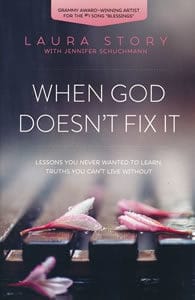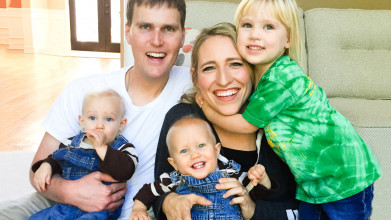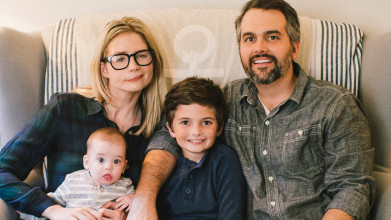Teaser:
Mrs. Laura Story Elvington: And so, I’ll never forget getting this, even that first time after that initial surgery and … and as soon as our eyes met, he said, “You’re Laura Story.” (Laughing) And I thought, oh, good, he remembers me. And then I could tell he was a little confused and he said, “What are you doing here?” (Laughing)
And so, I’m thinking, how do I break this news to him and finally I said, “You know, I’m here because I’m your wife and we’re married. We walked the aisle, you know, that whole thing with our family, the white dress, all of that.” And he looked at me just so stunned and finally said, “We’re married, yes!” (Laughter)
End of Teaser
John Fuller: That’s Christian recording artist Laura Story and she joins us on today’s “Focus on the Family,” along with her husband, Martin. I’m John Fuller and your host is Focus president and author, Jim Daly.
Jim Daly: John, Laura and Martin started to share their remarkable story, if I could be that blunt, yesterday. Just a year and a half into their marriage, their hopes and dreams for a perfect future or certainly a good future, it was shattered when Martin was diagnosed with a brain tumor. Um … he went through a couple of surgeries. He had setbacks medically in those early days and has come out on the other side, although not completely restored. He has some short-term memory loss issues and some other challenges.
But you can imagine how this affected their marriage and yeah, I don’t know where you’re at in your marriage and if I could be bold enough to say, how you’re looking at your circumstances, maybe blaming God, maybe challenging God to say, “Where are You in the midst of my difficulty?” I think their story today and last time will help you put that into perspective.
John: Yeah it was really an unvarnished look at the Christian faith when you collide with the realities that are not what you expected. And you can find out online about the CD or the app or the download so you can listen to that entire first part of the conversation with Laura and Martin. Just go to www.focusonthefamily.com/radio.
Jim: Welcome back to the program.
Laura: Thanks for havin’ us.
Martin Elvington: So glad to be here.
Jim: Hey, when we heard that opening clip, what were you feeling and how did you react to that when Martin said, “What are you doing here?”
Laura: (Laughing) Well, first of all, it seems like a story you’re telling me, you know what I mean?
Jim: Yeah.
Laura: It doesn’t even seem real now. I guess it’s been 10 years and it’s something we never imagined ourselves walking through. And it’s funny, ’cause even when we look back on all the details of it, there were some times that really you can’t help but laugh at, you know, him not even knowing that we were married and so many things that he had to relearn. So, the Lord, you know, kinda gave us a sense of humor in the midst of it, but it still was by far, the hardest thing we’d ever walked through.
John: Now [was] the surgery expected to kinda take care of these symptoms that you were dealing with, Martin? And were you coming out of it, the two of you, thinking, okay, now we’re gonna get this behind us and we’ll be able to move on and be the young married couple that we anticipated being?
Martin: That was our hope, yes and the surgery was to remove the tumor and also remove the symptoms that I was experiencing, the fatigue.
John: Falling asleep in class, those kinds of things.
Martin: Right, yeah.
Jim: Laura, you wrote about how this became a new normal. You referenced that last time. What does new normal look like? Some people might say, no, don’t settle for a new normal.
Laura: Yes.
Jim: Plead with God to get the old normal back.
Laura: Absolutely and you know, we went into this surgery, you know, we’re on this road of life, you know, still kind of in the honeymoon phase of our relationship and kinda hit this bump in the road called “brain tumor” and thought, okay, we need a surgery. We’re gonna fix this and it was as if the road was kinda takin’ a little detour.
But after several years of, you know, some of these disabilities not improving, at some point in time we had to come to term with the fact that this isn’t actually a detour. This is actually the road. And that was hard for us logistically, you know, just practically speaking. Our lives look a whole lot different with Martin’s disability, whether it’s, you know, his work. He’s unable to drive and works part-time and just logistic things around our home.
But also on a spiritual level, it has been hard for us as believers to understand, you know, why wouldn’t a good and perfect and loving Father fix this?
Jim: Let me ask you this.
Laura: Yes.
Jim: Romans 8:28, which is a verse many Christians know, says, “And we know that for those who love God, all things work together for good, for those who are called according to His purpose.” People, friends may have thrown that Scripture your direction in your circumstance. A, how did that feel? And B, have you see that come to pass?
Laura: Well, the “How did that feel?” that’s a great question to start. I remember being in the hospital and people would come visit and there were days that Martin, you know, he was on life support and we were wondering whether or not he would make it through the night.
And I would have friends that would say, “You know, God works all things together for good and if you don’t see him in this side of heaven, he’ll be with you, you know, he’s spending eternity with Jesus.” And I’m thinking, that doesn’t make me feel better right now and I joked a lot that my favorite words that any human ever said to me in the hospital were, “Here’s your latte.” (Laughing) Just bring me a nice warm cup of coffee and sit and let me cry on your shoulder. I don’t necessarily need, you know, all those Bible verse Band-Aids. You know, I’m sitting here kinda bleeding out and you’re trying to give me a quick Jesus fix.
And so, I learned that even though those verses are true, there’s a part of walking through a trial, this mourning and grieving part that sometimes as Christians, we’re so quick to rush in with “Jesus is the answer.” And even though I wholeheartedly believe that Jesus is the answer, but sometimes just due to our own discomfort, we don’t want to sit in the waiting. We don’t want to sit in the grieving with people who are hurting. And I think that sometimes they can’t hear the truth that we’re speaking, because we’re not really hearing their grief.
Jim: Yeah, I mean, that is so good. I’m thinking of Jesus with Lazarus.
Laura: Absolutely.
Jim: And of course, you see Mary in tears.
Laura: Yes.
Jim: But here she has seen Jesus do miracles.
Laura: Yes.
Jim: It had to be perplexing to her.
Laura: Well, and the Scriptures say that God is near to the brokenhearted. You know, when’s the last time we took the time to be really near and present in someone’s pain before we jumped in with the truth of God?
Jim: So, really to nail this down, those things that were most helpful were more actions and deeds to help you just bear the burden and be present, not so much the words. When did the words become more important to you? How long did it take and when did somebody who might say, you know, somehow God’s gonna work this out for good, when was that more palatable for you?
Laura: Well, the words were always, I mean, God’s Word, it truly is healing. It doesn’t return void. It’s sharper than any [two-edged-sword]. Like I believe all of that to be true about His Word, but His Word, I believe is more effective when it’s spoken to you by a friend who’s walking with you, not so much someone standing over you shouting it down to you as you’re, you know, laying there crippled, but someone who’s lifting you up and it was the church coming around us, not just with words, but in deed, as well, bringing us meals, helping with rides.
Jim: Hm, yeah and Martin, for you, those kind of well-intentioned encouragements were probably both good and bad. How did that come down for you, because you’re the one experiencing the physical limitation, having the struggle? When a person would put their arm around you and say, “Hey, come on; God’s gonna work this out for good,” what did you respond with?
Martin: You know, well, I had a theological crisis. I was in full-time vocational ministry prior to this brain tumor and the very verse you just quoted was a verse that I actually used on multiple occasions to counsel college students who were going through trials in their own lives.
Jim: Sure.
Martin: And I would always use that verse. Laura talked about a spiritual Band-Aid, but I used that verse to encourage them and to say, you know, there’s reason to hope.
And so, I am now looking at the valley of what I would call “the brain tumor” and I would say, “Has God worked it together for good?” Absolutely, He absolutely has. Do I see good? There is not a day that goes by that I don’t see good that has come from my health condition.
But presuppositions that I placed on that verse were unbiblical. And this is what I mean. I assumed that the good was gonna look a certain way. I assumed that the good would necessarily outweigh the bad. And I’m placing my grid on that. you know, not God’s grid.
Jim: Sure.
Martin: I’m placing my human grid, because God’s grid is correct. My grid is flawed. But I would say, if I experience this much bad, then I want to see this much good.
Jim: Right, to balance it out.
Martin: Yeah, to balance it out and so, I think God absolutely works all things together for His good, for His glory and I’ll be very clear, there are no mistakes. I think God is sitting on His throne. He knows exactly what He’s doing and He’s not in heaven wringing His hands, trying to figure out how to work this thing together for good. He knows exactly what He’s doing and He’s in complete control. Our experience of our trials and our experience of our suffering and our interpretation of our suffering is what’s flawed.
Jim: Right.
Martin: And that’s what I’ve had to come to grips with. And so …
Jim: Can I ask you though in terms of thinking about that, why is it flawed? ‘Cause I totally agree. And I’m thinking of the Scripture in Romans 5, where Paul writes, “More than that, we rejoice in our sufferings, knowing that suffering produces endurance.”
Now think of your circumstance. Suffering produces endurance and endurance produces character and character produces hope and hope does not put us to shame because God’s love has been poured into our hearts through the Holy Spirit, who has been given to us. Man, that’s gotta be a verse for your lives now, that God is not wasting this, but you can’t totally understand why.
Laura: Uh-hm.
Martin: John Piper had a message, Don’t Waste Your Cancer. And he talks about not allowing your trial, in this case a … a medical trial, be the thing that destroy[s] your faith. But allowing God to use it and to redeem it to work together for good in your own life and also for the good of the body of Christ.
Jim: Yeah.
Martin: And so, that’s what we’ve seen. We have seen that.
Jim: And I think the biggest thing that we need to learn from your circumstances, from other circumstances, think of the Middle East and what’s happening to Christians there.
Laura: Uh-hm.
Jim: Christians have been killed and not 1,000 years ago, not 2,000 years ago, 100 days ago, yesterday perhaps. And how do you explain that suffering to those families?
Laura: Well, you mentioned Romans 5. You know, there’s a verse in, I think it’s Romans 5:12 that talks about, you know, it was through the Fall that sin entered into this world. I meet so many people who are struggling, whether it’s struggling with infertility or struggling in their marriage with adultery or addiction, no matter what it is and they’re always asking that same question, why do these bad things happen?
And I always kinda give ’em two answers, which I feel like are the answers found in Romans 5. One is, we have suffering because sin entered the world and it marred creation. And that looks like cancer and addiction and adultery and infertility and children born with disabilities. That’s sin’s effect on creation.
And the second reason is so the glory of God might be displayed. And it’s hard to understand how those two things work together. I don’t understand. I’ll tell you. I always love how Joni Eareckson Tada says it.
Jim: Oh, yeah.
Laura: She says it’s God allowing that which He hates to accomplish that which He loves.
Jim: Yeah.
Laura: It’s not our job to understand why all the suffering happens here. It’s our job to acknowledge that this is an effect of the Fall and to believe that God, through Jesus Christ, is redeeming all things.
And some of those things we get to be part of, like you talked about the suffering overseas and the poverty. We as the church get to be a part of seeing that redemption. And then there [are] other things like what we’ve walked through. It’s just trusting that God still has a plan and that He has this ability to shine His light and grace through our brokenness.
John: Well, we’re talking today with Laura Story and Martin Elvington, Laura Story, the Christian music artist, about life events that took them way off course according to their own understanding of that they had planned. And you might be livin’ there. You might be identifying with some aspect of their conversation. Call us if we can be of help. Our number is 800-A-FAMILY. We have a Find-A-Counselor tool and the CD or download of this conversation, as well and Laura’s book, When God Doesn’t Fix It, at www.focusonthefamily.com/radio.
And we haven’t really described what day-to-day life is like for you right now. I mean, you’ve got a busy household. You have three children. Martin, you’re working part-time. Laura, you’re on the road some. You lead worship. There’s a lot goin’ on. What’s it look like in light of the challenges of short-term memory loss and some of the other health issues that you have to deal with as a couple and family?
Martin: I write down a lot of notes. (Laughter)
John: Sticky notes?
Laura: That’s true.
Jim: Big notebook, huh?
Martin: I honestly, I [use] the notes application on my phone, Gazette, to write down a lot of things. And I set a lot of alarms. There have been some movies made about people with short-term memory deficits and that’s really hard, you know.
John: Well, and Laura, you mentioned sometimes Martin’ll ask you several times where something is. I mean, you’ve gotta balance that with the children and all of the other things going on.
Laura: Yes and even that, you know, thinking about what the Lord’s doing in my life, you know, how is God using this trial to teach me something? And one of the things that He has taught me is, I immediately, you know, the flesh in me immediately bucks up against anything that doesn’t fit into my agenda. This whole disability thing did not fit into my timetable. And as a family, there are things that it takes us longer to do. There [are] a couple things that just kinda take longer because of disability. And I realize how (Laughing) efficiency minded, you know. Efficiency focused I am.
Jim: Uh-hm.
Laura: And so, the Lord used it for both of us just to encourage us to slow down and to care more about kinda what He’s trying to accomplish in us than necessarily what I’m trying to accomplish.
Jim: Do you know one of the things that is so difficult is, when you look at the character of God. One of those attributes is He’s selfless, right, toward us.
Laura: Uh-hm.
Jim: And when you look at these circumstances like what we’ve been talking about and describing in your life and in other people’s lives, the circumstances are different, but the outcome, I think the desired outcome from where God is sitting is the same, to make us more like Him. And so, it challenges our selfish nature where we have to give up things because of circumstances. And it makes us more like Him if we embrace it, but man, it grates against our human flesh, doesn’t it?
Laura: Absolutely.
Jim: We like being comfortable. We like leisure time. We like that stuff and God’s saying, you know what? That’s not who I am.
John: And there’s a tendency to kinda project perfection and when you have a hidden disability, I mean, Martin, I’m not sure that somebody would meet you and know that you have this short-term memory loss, then you’ve gotta collide with those expectations and what other people think, right? I mean, how often do you have to deal with that?
Laura: Yeah, I’d say our family looks very different than other people. And so, we have to just come to terms with, we’re just gonna look different and that’s a good thing. And we’re kind of a mess (Laughing); I’ll be honest with you. If you were to see us, you know, in the grocery store with our three kids, 4 and under and you know, Martin sometimes tripping over them, ’cause he, you know, he only has 50 percent of his vision. He trips over it.
And if you saw us, you would think, gosh, those people are a mess. They need Jesus. (Laughter) And the truth is, is we do; we desperately need Jesus. And I’m learning to accept that anything in our lives that causes us greater awareness of that need for Jesus, that’s actually a good thing.
Jim: Yeah. Laura, you’ve had a number of great hits in Christian music. Perhaps one of the strongest was “Blessings.” Talk about the genesis of that. I heard, I think you may have said it in your book, you actually started writing that on the back of a gas receipt.
Laura: I write a lot in my car. (Laughter) I don’t know what it is.
Jim: In your car, that’s where you get struck with your creativity.
Laura: I guess so.
Jim: I don’t know that I could write anything on the back of these gas receipts. (Laughter) They’re so small. But how did that come about and what were you aiming for? And what in your circumstances poured into your music now?
Laura: I think it began more just as a diary entry. Martin and I were driving down a little stretch of I-20 in Alabama. I don’t know why I remember that so well, but it was maybe about 1 a.m. and God had just begun to open a door for me to go and minister to other people through song, which is something I never imagined myself doing.
But we were finding that the greatest vehicle for ministry was actually this broken story that we had, this disability, this trial that we never expected. And that was the greatest connecting point. People were wanting to hear our story and I think it was because they wanted to hear the story of God’s faithfulness in the midst of such a broken situation.
And I began to reflect on that and think, you know, God, You didn’t do this the way that I wanted You to. Our lives look so different than what I expected, but there has been so much good that has come out of this situation. And that’s tough, because it has been a hard situation to walk through. But what I’m learning is, it’s not necessarily the things we go through in life. It’s how we go through the things we go through in life, you know.
And no matter what you’re walking through today, no matter what anyone is facing, we truly at the end of the day have two options. We can either walk through it with a clenched fist and say, I’m just gonna be bitter at God over this or we can walk through it with an open hand and say, God, this isn’t the story I expected for my life, but I want to ask You to show me the blessings even in the midst of all the pain.
John: Isn’t that an ongoing decision though?
Laura: It sure is. It’s a decision I have to make every morning.
Jim: And you have said this. I want to punch this once again. In your book you said, if our marriage wasn’t good, it was because of the disability. That’s a lie. The biggest problem in our marriage was our sin. Every one of us listening to your story right now can apply that, ’cause we will blame that person, our spouse for our marriage not being what it should be, but it’s our own sin, isn’t it?
Laura: Uh-hm and as believers, we are all about following Jesus when He’s going in the direction that we want to go. (Laughing) But when it ends up being contrary to what’s comfortable, contrary to what we’re expecting, it requires a greater level of faith. And it was a struggle for us, but it has definitely been worth the struggle to live lives now that are more surrendered to His purposes.
Jim: The parenting aspect, how practical or impractical is that given your circumstances? I mean, I would think the good thing is, is when they misbehave, you might forget it literally (Laughter), which the kids would love.
Martin: Yeah, well, it is. There’ll be times where I’m watchin’ my little daughter and Laura will, you know, she’ll have left the house and so, she’ll give me a quick reminder. Now Josie, she goes down to bed at such and such a time. And make sure you do X, Y, and Z with the boys. And I’ll say, “Got it.”
And if I fail to write it down, maybe later that night I’ll say, “Now Josie, you’re going to bed at this time, right?” And (Laughter) that’s when she has the opportunity to use that against me and she’ll say, “No!”
Jim: They might start messin’ with you.
Martin: –“I’m stayin’ up. Mom said I could say up and watch TV.”
Jim: I was gonna say, teenagers, when they’re teenagers, you’re gonna be in trouble.
Martin: Yeah, yeah, so, no, there are things that I am concerned about when they become a little older. Right now, it is kinda humorous. But you know, when my daughter comes home from school one day and she shares somethin’ with me that it’s really important to her or maybe you know, will I forget that? I’m deeply concerned about the day that she shares something either a relationship, maybe the first time she has an interest in a boy or somethin’ or I don’t know, just something that is very important to her and I forget it. I don’t like that. That’s where I want to capture those moments. I’m gonna use the tools that God’s made available to me to fight against that disability.
Jim: You know what though, let me put your mind at ease, because I think what you’re gonna find in your kids, I really do believe this, is they will grow up with such deep empathy, because they’re gonna see in you the struggle and they’re gonna want to be there for you and they’re gonna learn how to feel what you feel and that will make all the difference. Your kids will learn so much because of what you’ve come through. Don’t sell that short. I think they’ll be better people because of what they see in you.
Laura: Well, last week (Laughing) I was picking up Josie, our 4-year-old from school and I pull up to the little car pool line and her teacher said, “Hey, I wanted to tell you something real quick about Josie.” And I thought, oh, no. (Laughing) Here it comes.
Jim: Yeah.
Laura: Who know what she’s done this time? And the teacher said, she said, “I just want to brag on her for a second.” So, I’m gonna try to get through this without crying. Said, “I want to brag on her for a second.” She said, “There’s a little boy in our class with a learning disability, somewhere in the auti … autism spectrum. And sometimes he has trouble getting in line when he’s supposed to or getting’ his lunch cleaned up when he’s supposed to.” And she said, “Every time Josie goes over and grabs Keller’s hand and pulls him into line with her or says, “Now Keller, it’s time to clean up.” she said, “I’m so encouraged at how compassionate Josie is towards this little boy.”
And I looked at her teacher and I said, “Well,” I said, “That’s neat. I don’t know if you know this, but her father has a severe learning disability.” And she just kinda was so taken back by it. And I said, “It’s so neat to see God truly working all things together for good.”
Jim: And nothing is wasted.
Laura: And nothing is wasted. And when I think about our prayer for Josie, it wouldn’t be that she’s the smartest kid in the class. It would be that the Lord would develop in her a heart of kindness and compassion. And He uses things like disabilities to do that.
Jim: That is beautiful and that’s the lesson and the benefit of what you’ve gone through and what we have heard these last couple of days. It has been wonderful to have you on “Focus on the Family.” Thank you for your story, which is a story of hope. Even though the title is When God Doesn’t Fix It, it is hopeful. Thanks.
Martin: Thank you.
John: And I’ll remind you that here at Focus on the Family, we have caring Christian counselors. We have resources. Certainly we have Laura’s book, When God Doesn’t Fix It and a CD or a download of our conversation the past couple of days, for you or to pass on to somebody. It may be that you know somebody that is recovering in the hospital and waiting for a good word. Perhaps what you’ve heard here today could be of encouragement to them. We’re just a phone call away. It’s 800, the letter A and the word FAMILY; 800-232-6459.
And when you donate to Focus on the Family, you’re helping us help others. And we’d like to say thank you for your generosity today by sending a copy of Laura’s book.
Jim: Hey, Martin, I know you were a catcher and we started the program last time talkin’ about that and the ministry trip you went on to Nicaragua and I’m sure you had dreams to be that college catcher that you probably thought about when you were a kid.
I was given a ball I want to give to you, ’cause this is a ball that’s signed by Don Larson, who pitched the only perfect game in the World Series from 1956. But I think you deserve this and I want to give this to you.
Martin: What in the world!
John: Wow.
Martin: Oh, my goodness.
Jim: So, there you go, catcher, from a Hall of Fame pitcher. I think you are demonstrating something more significant than your baseball ability, just livin’ life for God the way you are. So, God bless you.
Martin: Thank you. It was awfully kind of you. Thank you very much.
John: On behalf of Jim Daly and the entire team, thanks for listening. I’m John Fuller, inviting you back tomorrow, as British Evangelist J.John provides four reasons why he believes the message of the gospel.
Excerpt:
J.John: I’m a Christian because it’s true. I’m a Christian because I need forgiveness. I’m a Christian because Jesus died for me. I’m a Christian because it actually works.
End of Excerpt
John: Join us again next time, as we once more help you and your family thrive.























